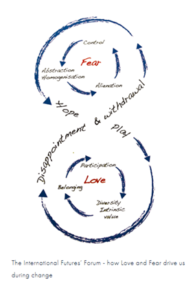Synopsis:
In this blog, Katy Steward explores the importance of positive, empathic leadership in the face of the Covid19 emergency, and how a different style from ‘command and control’ can help bring out the best in leaders and teams. The NHS will need leaders to support each other and harness team energy as the situation continues. We are all affected by the crisis, but we can individually choose how we respond to it through the fundamental drivers of Love and Fear. Katy encourages us to stay in in tune with our emotional responses and offers suggestions to create and maintain a positive and empathic approach to leading teams and organisations.
Maintaining Humanity in the Covid 19 Crisis
Positive, empathic leadership matters to build resilient cultures
‘We have been working hard for many weeks, whilst dealing with patients through the medium of masks, gloves and PPE has changed the way we care for and connect with patients, and it can take ages at the end of a shift to put on and take off PPE, making a long day even longer. …Throughout all this I watch other skilful colleagues who have found their own ways of coming to compassion and have been inspired by them’ – Medical Director.
Over recent weeks, the pressure on everyone working in healthcare has built to unprecedented levels as Covid19 escalated. With it has come fear, stress, anxiety and exhaustion in frontline teams. To counter this, leaders have personally harnessed their own awareness and positive emotions like those in the quote above. Positivity helps create compassionate, resilient cultures which humanise healthcare.[i]
Two big challenges face clinical leaders in this crisis. One, the need to rapidly create positive, compassionate cultures, with high trust and empathy between team members, creating stronger relationships. The other, to manage unprecedented complexity and pace of change, requiring directive, rather than controlling leadership. But evidence shows that at times of crisis, leaders tend to switch to control behaviours, which in turn threaten to undermine high trust culture.
The power of positive emotions as a leader
Healthcare now needs empathic leaders, who are skilled at combining appreciative, open cultures with clear direction. Empathy is a state of mind where we genuinely want to notice what is going on in the mind of the other and understand how they think or feel. These leaders make a point of fostering positivity, intentionally being aware of their situation, noticing how patients, nurses and medical students are behaving, and pausing to consider thoughtfully their own responses before reacting to others. It’s particularly effective when leaders start from a position in all their dealings of listening deeply and assuming ‘positive intent’. When leaders work from a place of insight, they create open, psychologically safe, engaged and resilient environments.
Leading in this way is a lot to ask. Many people will be super stressed, working in a regime described as ‘work-work-collapse’. Faced with emotional, mental and physical demands, stress will affect our relationships with colleagues, perhaps leading to heated exchanges. Because we are human, we are likely to spend much more time trying to make sense of negative events than we do enjoying positive ones. We go over and over the situation, questioning our judgement, or analysing the breakdowns in the system, or the suffering for patients and staff. This creates more fear, which in turn requires more control.
How to be conscious of the culture we’re creating
Love and Fear Loops[ii] are a helpful device to think about balancing two fundamental and distinctive ways of knowing and interacting with the world.

Fear equates to knowing the world by gaining control, typically by focusing on the facts: targets, bed occupancy, throughput, staff numbers. When this goes too far, everything is treated as an object. The trouble is that in complex situations there is also a great deal of emotion and humans don’t take kindly to being treated too objectively.
Love is an alternative way of choosing to interact, based on knowing the world through participation; taking notice of your own and others’ feelings, relishing the diversity of the team, appreciating small acts of kindness: someone holding the door open, or fetching a sandwich for you. Or, when engaged in heated discussion, instead of getting irritated, pausing and appreciating how passionately the team member cares about what happens.
Love and Fear responses are both always available to us. The challenge is to get the right balance.
Personally choosing positivity over fear
Six things leaders can do to stay positive and achieve balance:
First: Staying in touch with your feelings of trust – finding time – a pause – for self-reflection[iii] and self-compassion (without self-criticism) may not seem a priority, but it’s vital to stay in tune with yourself, remembering that fear is the fundamental driver of negative emotions. What do you need to feel less fear and more trust? Asking for support, demanding answers to questions, or just acknowledging the unsettled and disturbing situation can help.
Second: Explicit gratitude – telling someone that they have done something that was meaningful to you not only makes them feel good but will also make you feel happier.
Third: Appreciative check in – create a positive tone and helps people be more attuned to others starting a shift or meeting. Ask if someone is willing to share a highlight from the previous shift. This can help lift the mood of the group and generates useful information so the group is more open.
Fourth: ‘Tune in’ to others: If every complaint is ‘an expression of an unmet need’, try to flip complaints or negativity, thinking ‘what is the unmet need behind this?’ Usually the need is for validation; confirmation their concern has been heard, understood and you intend to take action.
Fifth: Positive gossip: Gossip is a powerful social tool, strongly influencing the experience of team members and patients. It’s almost always negative, choose instead positive gossip, telling only positive things about one another and our community.
Sixth: Finding the positive deviant – who is coping really well and what can we learn from them?
The humanity shown in this crisis has brought people together, creating meaning, purpose and an intense awareness of our communities. We are all affected by the Covid19 crisis and a spirit of positive leadership, underpinned by collective and compassionate behaviours must prevail.
References:
[i] West MA et al., (2014) Developing collective leadership for health care, The Kings Fund and Centre for Creative Leadership
[ii] Leicester, G., SHINE Changing the Culture of Care, International Futures Forum, 2018
[iii] Bion WR, Learning from Experience, Karnac Books, 1962

Dr Katy Steward
Dr Katy Steward is a leadership and organisation development and health policy professional. She has worked with health leaders to create more open cultures for over 20 years and has been active in various initiatives to promote healthy cultures in health care, including Programme Director, Leadership for Medical Directors at the Kings Fund. Her work applies her Phd research on teamwork and organisational learning.
Conflicts of Interest
I have read and understood BMJ policy on declaration of interests and have the following interests to declare. I am a non-executive director on an NHS trust board and Chair the committees on Culture and Quality Assurance. I am also the founder of Katy Steward Organisation Development that has undertaken paid consultancy work on health culture in the past.